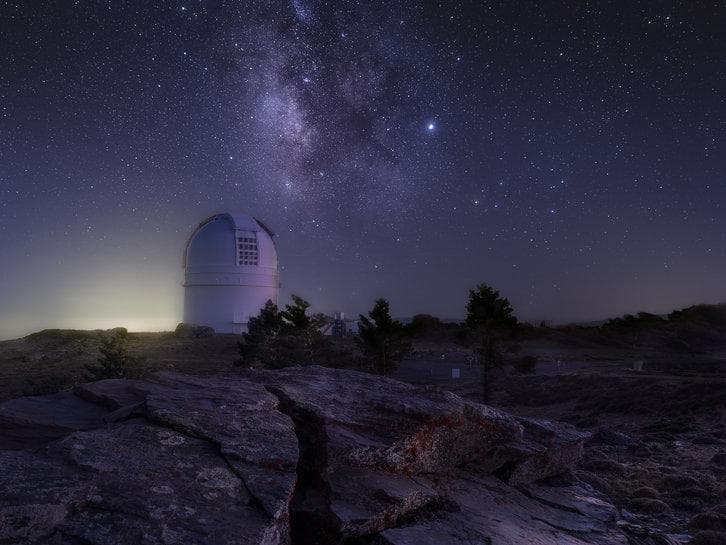First star I see tonight
اولین ستارهای که امشب میبینم
Dr Tomas Streyer looked around the control room at his team of scientists and engineers. He was excited and frightened but he tried to seem calm. In a few minutes, they might start to discover something amazing: how the universe began.
دکتر توماس استریر در اتاق کنترل به تیم دانشمندان و مهندسان خود نگاه کرد. اگرچه هیجانزده و آشفتهحال بود، اما سعی میکرد که آرام به نظر برسد. تا چند دقیقهی بعد آنها ممکن بود که آغاز یک کشف شگفتانگیز را رقم بزنند: اینکه جهان چگونه آغاز شد.
He looked out of the window at the beautiful blue summer sky and tried to breathe slowly.
او از پنجره به آسمان آبی و زیبای تابستان نگاهی انداخت و سعی کرد که به آرامی نفس بکشد.
'Ready,' he said. He pressed the first button and the complicated computers and machines came to life.
گفت: «آماده»، اولین دکمه را فشار داد و کامپیوترها و ماشینهای پیچیده آغاز به کار کردند.
'Set,' he said. He pressed the second button and switched on the large particle accelerator that lay under the towns and fields of Switzerland.
گفت: «تنظیم»، دکمهی دوم را فشار داد و شتابدهندهی بزرگ ذرات را، که در زیر شهرها و زمینهای سوئیس قرار داشت، روشن کرد.
'Go,' he said. And, at exactly twelve o'clock, he pressed the final button.
گفت: «حرکت»، و راس ساعت دوازده دکمهی آخر را فشار داد.
For a second, he felt as if he was blind, because everything went completely black. Tomas shouted in shock, but the lights were already on again. That was not part of his plan. He had no idea what had just happened.
برای یک ثانیه احساس کرد که کور شده است، زیرا همه چیز کاملا سیاه شد. توماس در حالتی از بهت فریاد کشید، اما چراغها دوباره روشن شده بودند. این بخشی از برنامهی او نبود برای همین نمیدانست چه اتفاقی افتاده است.
'Everybody, check the systems!' he ordered. But nothing seemed to be wrong with them. The particle accelerator was working perfectly.
دستور داد: «تمام افراد سیستمها را بررسی کنید!» اما ظاهرا هیچ مشکلی در سیستمها وجود نداشت. شتابدهندهی ذرات بدون هر گونه ایرادی در حال کار بود.
'Tomas,' said his assistant. 'Look outside.' She sounded afraid.
دستیارش گفت: «توماس، بیرون را نگاه کن.» صدایش آمیخته با هراس بود.
The perfect summer's day of five minutes ago had gone. Instead, the sky was darker than the blackest night. But that wasn't the worst thing. The sun wasn't there, and the moon and stars were also gone.
آن روز تابستانی و ایدهآل پنج دقیقهی پیش از بین رفته بود. در عوض، آسمان تاریکتر از سیاهترین شب بود. اما از آن هم بدتر این بود که خورشید و ماه و ستارهها نیز از بین رفته بودند.
People were shouting and screaming. They started calling their families on the telephone because they were afraid they had all gone too. Tomas felt as if it was hard to breathe, but he counted to ten and tried to breathe slowly. He sat at the main computer and started reading the information and numbers from his experiment. But he couldn’t find anything to explain what was happening. He ran out of the exit with the rest of his team until they were all outside the building.
افراد جیغ میکشیدند و فریاد میزدند. سپس شروع به تماس گرفتن با خانوادهی خود کردند زیرا میترسیدند که آنها هم رفته باشند. توماس احساس کرد که نفس کشیدن برایش دشوار شده است، تا ده شمرد و سعی کرد که بهآرامی نفس بکشد. پشت کامپیوتر اصلی نشست و به مرور کردن اطلاعات و اعداد آزمایش خود مشغول شد. اما هیچ دلیلی برای رویداد پیشآمده پیدا نکرد. وی به همراه دیگر اعضای تیمش از در خروجی به سمت بیرون دوید تا اینکه تمامی آنها بیرون از ساختمان جمع شدند.
Everyone else in the building was outside, frightened and confused. They were using the screens and lights on their mobile phones to see better. Several people got in their cars and turned on the lights. They drove to the entrance to make a small area of light for everybody to stand together. The street lights turned on, but most people were still afraid.
دیگر افرادی که در ساختمان بودند نیز به بیرون آمدند، درحالیکه کاملا آشفته و سردرگم بودند. آنها از صفحهی نمایش و چراغ قوهی تلفن همراه خود برای بهتر دیدن استفاده میکردند. چند نفر سراغ ماشینهای خود رفته و چراغها را روشن کردند. سپس به سمت ورودی ساختمان حرکت کردند تا یک منطقهی نورانی کوچک را برای تمامی افراد ایجاد کنند. در این بین چراغهای خیابان روشن شد، اما بیشتر افراد همچنان در هراس بودند.
Then, almost twenty minutes after Tomas had started the particle accelerator, the sun was in the sky again. It was warm and yellow, and the black sky turned blue again. Everyone started laughing and dancing around, and Tomas felt as if he could breathe normally again.
تقریباً بیست دقیقه پس از اینکه توماس شتابدهندهی ذرات را راهاندازی کرد، خورشید دوباره در آسمان پدیدار شد. خورشید گرم و زرد بود و آسمان سیاه دوباره آبی شد. اکنون همه در حال خندیدن و رقصیدن بودند و توماس نیز احساس کرد که دوباره میتواند به راحتی نفس بکشد.
But later, hours later, when the real night began, no one was happy. Because, although the moon rose again, there were no stars in the sky at all.
اما بعد، ساعاتی بعد، وقتی شب فرا رسید، هیچ اثری از آن خوشحالی باقی نماند. زیرا اگرچه ماه دوباره طلوع کرد، اما هیچ ستارهای در آسمان نبود.
.......
No one wanted to know what Tomas' work was actually about. They didn't care what the particle accelerator was for. What did that matter? All they cared about was what had happened after he turned the machine on. He had stolen all the stars – or that's what the newspapers said. And when they made him go to the International Criminal Court, they charged him with stealing the stars.
هیچ کس علاقهای به دانستن این موضوع نداشت که کار توماس دقیقا چیست. حتی برایشان مهم نبود که شتابدهندهی ذرات برای چیست و چه اهمیتی دارد؟ تنها چیزی که به آن اهمیت میدادند این بود که بعد از روشن شدن دستگاه چه اتفاقی رخ داده است. او تمام ستارگان را دزدیده بود، یا حداقل این چیزی بود که روزنامهها میگفتند. به هر طریق پس از احضار وی به دادگاه کیفری بینالمللی نهایتا او را به سرقت ستارهها متهم کردند.
Tomas said, 'I'm not guilty.'
توماس گفت: «من مقصر نیستم.»
'Well, if you didn’t steal the stars, Dr Streyer,' said the lawyer for the prosecution, 'what did you do?'
وکیل دادگستری گفت: «دکتر استریر، اگر ستارهها را ندزدیدهای، پس چه کار کردهای؟»
'If you're asking about my work,' said Tomas, 'we didn't do anything. We showed that the machine was working, that's all.'
توماس گفت: «اگر پرسش شما درمورد کار من است، ما هیچ کار خاصی نکردیم، فقط نشان دادیم که دستگاه کار میکند، همین.»
'Taking the stars from the sky seems like nothing to you?' The lawyer looked around at the people in the court. 'No one here would think it's nothing. No one in the world would think it's nothing.'
وکیل به حضار نگاه کرد و گفت: «برداشتن ستارهها از آسمان از نظر شما هیچ کار خاصی نیست؟ مسلما حاضرین این دادگاه و تمام مردم جهان با شما هم عقیده نیستند.»
'That's not what I meant,' said Tomas. 'But I can tell you this: when the machine started, there were suddenly no photons in the test room.'
توماس گفت: «منظور من این نبود. اما در همین حد میتوانم بگویم که وقتی دستگاه شروع به کار کرد، ناگهان هیچ فوتونی در آزمایشگاه باقی نماند.»
'What? Photons? We aren't all scientists here! Speak simple English, Dr Streyer!'
«چه چیزی؟ فوتونها؟ ما که مثل شما دانشمند نیستیم دکتر استریر! به زبان سادهتری صحبت کنید!»
'Light,' said Tomas. 'For just a moment it was as if there was no light in our laboratory. Then we saw it was also dark outside … until the light became normal again.'
توماس گفت: «نور. فقط برای یک لحظه انگار هیچ نوری در آزمایشگاه ما وجود نداشت. سپس دریافتیم که بیرون هم تاریک است... تا اینکه نور دوباره عادی شد.»
'Normal, Dr Streyer? It wasn't normal when …' – the lawyer checked his notes – '… the sun went out for exactly sixteen minutes and forty seconds. Perhaps we can say the rest of the day was normal. But the night hasn't been normal ever since, has it?'
«عادی، دکتر استریر؟ زمانی که ...، وکیل یادداشتهایش را بررسی کرد، هیچ وضعیت عادی وجود نداشت ... وقتی خورشید دقیقاً به مدت شانزده دقیقه و چهل ثانیه بدون پرتو بود. شاید بتوان گفت که در باقی روز وضعیت عادی بود. اما از آن زمان تا کنون وضعیت شب همچنان به حالت عادی بازنگشته است، اینطور نیست؟»
Tomas looked sad. 'I know. But you must believe me. I didn't do anything that could have taken the stars from the sky!'
توماس با حالتی غمگین پاسخ داد: «میدانم. اما باور کنید کاری که من کردم نمیتواند باعث محو شدن ستارهها از آسمان شود!»
'So are you saying you didn't steal the stars from us?' said the lawyer.
وکیل گفت: «پس آیا میگویید که شما ستارهها را ندزدیدهاید؟»
'No, I didn't steal them,' Tomas said.
توماس گفت: «نه، من آنها را ندزدیدهام.»
'You just made it so that we can't see them any more.'
«اما کاری کردهای که دیگر نمیتوانیم آنها را ببینیم.»
After a long pause, Tomas spoke. 'Yes,' he said.
توماس پس از مکثی طولانی پاسخ داد: «بله»
'How is that any different?' the lawyer asked.
وکیل پرسید: «این کار چه تفاوتی با دزدیدن آنها دارد؟»
Tomas didn't have an answer, not one anyone would understand anyway. And if they understood it, they wouldn't believe him. He had an idea, but it would take years to prove it.
توماس پاسخی برای این پرسش نداشت، به هر حال هیچ کس نمیتوانست منظور او را متوجه شود. و حتی اگر متوجه میشدند، حرف او را باور نمیکردند. او ایدهای در سر داشت، اما اثبات آن سالها طول میکشید.
Instead, he changed his mind and said, 'I'm guilty.'
نهایتا نظرش عوض شد و گفت: «من مقصر هستم.»
.........
Now the world could blame someone for what it had lost. But there was no point sending Tomas to prison for years. It wouldn't change anything. Instead, they designed a punishment especially for him.
حالا دنیا میتوانست بابت از دادن ستارهها کسی را سرزنش کند. بااینحال سالها زندانی کردن توماس فایدهای نداشت و چیزی را تغییر نمیداد. به جای آن مجازاتی را مختص او طراحی کردند.
They sent Tomas to work at the Extremely Large Telescope in Paranal in Chile. Nobody used the telescope now. No tourists came to these high mountains to see the edges of our galaxy. No scientists asked for money to study the empty sky. All that passed through the night sky was the lonely moon and a few planets. Looking up made people feel bad.
آنها توماس را به کار کردن بر روی تلسکوپی بسیار بزرگ در پارانال شیلی محکوم کردند. زیرا با وجود این وضعیت جدید دیگر هیچ کس از تلسکوپ استفاده نمیکرد. هیچ توریستی برای دیدن لبههای کهکشان به این کوههای بلند نمیآمد. هیچ دانشمندی برای مطالعهی آسمان خالی دستمزدی درخواست نمیکرد. تنها چیزی که از آسمان شب میگذشت یک ماه تنها و چندین سیاره بود. حتی نگاه کردن به آسمان نیز موجب اندوه مردم میشد.
Tomas thought it was fair that they punished him. And the job was almost the same as prison because he was completely alone. After a few years, the world forgot about him. Or, at least, everyone decided to leave him alone. Every evening he watched the sun go down. The red ball was gone exactly eight minutes and twenty seconds after it actually went behind the Earth. Tomas was almost happy to know that the laws of physics remained the same. Light still travelled at the same speed as it had always travelled. He hoped it meant he hadn't changed the universe that much. We know there is a speed light travels at, he thought, so perhaps the dark travels at the same speed.
توماس با خود اندیشید که مجازات کردن او کاملا عادلانه است. اینکه او مجبور به این کار باشد به خودی خود تفاوتی با زندان نداشت چون در آنجا کاملاً تنها بود. بعد از گذشت چندین سال کل دنیا او را فراموش کرد. یا حداقل همه تصمیم گرفتند که او را به حال خود رها کنند. وی هر روز عصر غروب خورشید را تماشا میکرد. خورشید سرخ دقیقاً هشت دقیقه و بیست ثانیه پس از رفتن به پشت زمین، ناپدید میشد. توماس حداقل از این نظر خوشحال بود که قوانین فیزیک همچنان ثابت باقی ماندهاند. نور همچنان با همان سرعت همیشگی حرکت میکرد. با این اوصاف تقریبا امیدوار بود که کار او جهان را آنقدرها هم تغییر نداده است. با خود اندیشید که ما میدانیم سرعتی برای حرکت نور وجود دارد، بنابراین شاید تاریکی نیز با همان سرعت حرکت میکند.
Of course, there was no way to prove his idea. Not yet. And, alone in the mountains, Tomas had nobody to share his idea with anyway.
البته هیچ راهی برای اثبات عقیدهی او وجود نداشت. البته نه تا کنون. توماس در کوهستان تنها بود و کسی را نداشت که ایدهی خود را با او در میان بگذارد.
........
High in the mountains of Chile, Tomas continued to watch the night sky. With the enormous telescope, he looked at the same place in the empty sky every night, even though there was nothing to see. And each day as the sun went down, he thought of the song his parents sang to him as a child:
در بالای کوههای شیلی توماس هر روز آسمان شب را تماشا میکرد. با این تلسکوپ عظیم هر شب به همان مکان از آسمان خالی چشم میدوخت، گرچه چیزی برای دیدن وجود نداشت. هر روز که خورشید غروب میکرد، به آوازی میاندیشید که والدینش در کودکی برای او میخواندند:
Star light, star bright, First star I see tonight, I wish I may, I wish I might, Have the wish I wish tonight.
ای نور ستاره، ای ستارهی درخشان ای اولین ستارهای که امشب میبینم ای کاش امشب آرزویم برآورده شود
For 1,596 black nights – nearly four and a half years – there was no change to the night sky. But that was OK. It didn't mean his idea was wrong. Tomas thought about the darkness he had created. He imagined it like a wave that had passed the sun. Now, maybe, it was continuing out towards the edge of our galaxy and further, to the stars. It would take 1,596 nights to pass the nearest star. It would take 1,596 more nights for that star's light to come back to Earth ... If the wave was real, of course. If his ideas were correct. If he was wrong, the stars were really gone forever.
به مدت 1,596 شب سیاه، نزدیک به چهار و نیم سال، هیچ تغییری در آسمان شب به وجود نیامد. اما ایرادی نداشت، این عدم تغییر بدان معنا نبود که ایدهی او اشتباه است. توماس به تاریکی که ایجاد کرده بود فکر کرد. او آن را مانند موجی تصور میکرد که از خورشید عبور کرده است. حالا شاید این موج به سمت لبهی کهکشان ما و دورتر، به سمت ستارهها در حال حرکت بود. عبور از نزدیکترین ستاره 1,596 شب طول میکشید. از طرفی 1,596شب دیگر هم طول میکشید تا نور آن ستاره به زمین بازگردد... البته به شرطی که این موج واقعیت داشته و ایدهی او درست باشد. زیرا در غیر اینصورت ستارهها به راستی برای همیشه ناپدید شده بودند.
........
And then one night 1,596 nights later, almost nine years after that terrible day, Tomas looked up from his telescope. There was Alpha Centauri twinkling back at him from the night sky.
و نهایتا یک شب، بعد از گذشت 1,596 شب، یعنی تقریباً نه سال پس از آن روز وحشتناک، توماس از تلسکوپ خود به آسمان نگاهی انداخت. ستارهی آلفاسنتوری بود که در آسمان شب به او چشمک میزد.
The first star.
اولین ستاره.
He felt tears in his eyes and he made a wish. And he imagined millions of other people were making their wishes too.
احساس کرد که اشک در چشمانش حلقه زده است. در دلش آرزویی کرد و به این موضوع اندیشید که میلیونها نفر دیگر نیز در آن لحظه در حال آرزو کردن هستند.
Story written by Andrew Leon Hudson and adapted by Nicola Prentis.
داستانی از اندرو لئون هادسون ، اقتباس توسط نیکولا پرنتیس .


